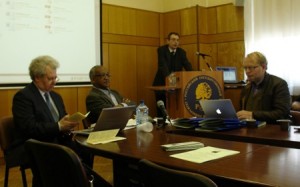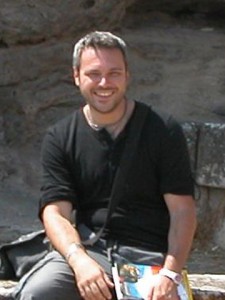From our doctoral researcher Elena Chepel:
Thanks to the generosity of the Department’s Austin Travel Fund I had the opportunity to attend the largest international classical conference in Russia, Gasparov readings, that was held in April, 18-20 at the Russian State University for the Humanities (RSUH), Moscow.
 This year the topic was Poetics of classical ode with main focus on Pindar and Horace. The organisers, Prof. Nikolay Grintser and Prof. Nina Braginskaya brought together a constellation of classical scholars from UK, Serbia, France, Russia, USA, and Greece. Among the contributors were Prof. Ian Rutherford (University of Reading), Dr. Sergey Stepantsov (Lomonosov Moscow State University), Prof. Ewen Bowie (University of Oxford), Dr. Ana Petkovic (University of Belgrade), Prof. Richard Martin (Stanford University), Prof. Dmitry Trubochkin (State Institute for Art Studies, Moscow), Prof. Chris Carey (UCL).
This year the topic was Poetics of classical ode with main focus on Pindar and Horace. The organisers, Prof. Nikolay Grintser and Prof. Nina Braginskaya brought together a constellation of classical scholars from UK, Serbia, France, Russia, USA, and Greece. Among the contributors were Prof. Ian Rutherford (University of Reading), Dr. Sergey Stepantsov (Lomonosov Moscow State University), Prof. Ewen Bowie (University of Oxford), Dr. Ana Petkovic (University of Belgrade), Prof. Richard Martin (Stanford University), Prof. Dmitry Trubochkin (State Institute for Art Studies, Moscow), Prof. Chris Carey (UCL).
RSUH runs this annual conference to commemorate life and academic research of the prominent Russian classicist and translator Mikhail Gasparov. Among the works translated by him are Horace’s On the art of poetry, Aristotle’s Poetics, Cicero’s Orator, Ovid’s Ars amatoria, and Phaedrus’ Fables. He is the author of the standard Russian translation of Pindar and Bacchylides. He also studied in depth classical and modern European versification.
As my PhD topic deals with ritual forms in Greek comedy, including prayers, hymns and other forms of worship of gods, I attended this conference to learn more about choral odes and other lyric genres in their ritual context and about their relationship with other literary genres, especially comic genres. The conference turned out to be most fruitful and inspiring for my research.
 I found Prof. Lucia Athanassaki’s talk on the celebratory occasion in Pindar and Horace extremely useful. She made a groundbreaking point about Horace’s awareness of the sociopolitical and ritual context of the Pindaric odes. I benefited a lot from the brilliant paper given by Dr. Maria Kazanskaya (Universite de Paris 4, Sorbonne – St-Petersbourg State University). It considered deviations from high style in Pindaric odes including low-style expressions, everyday images and irony.
I found Prof. Lucia Athanassaki’s talk on the celebratory occasion in Pindar and Horace extremely useful. She made a groundbreaking point about Horace’s awareness of the sociopolitical and ritual context of the Pindaric odes. I benefited a lot from the brilliant paper given by Dr. Maria Kazanskaya (Universite de Paris 4, Sorbonne – St-Petersbourg State University). It considered deviations from high style in Pindaric odes including low-style expressions, everyday images and irony.
Vivid and lively discussions continued during the coffee breaks. I had chance to meet new people and share ideas about my research in an informal and friendly atmosphere.
Dr. Alexey Belousov from the Lomonosov Moscow State University presented to the Department of Classics at Reading a bundle of volumes of Aristeas, a very successful Russian journal of classical philology and ancient history, that accepts articles in Russian, English, French, German, and Latin.
Every year, the Department of Classics supports its students with generous travel awards.




